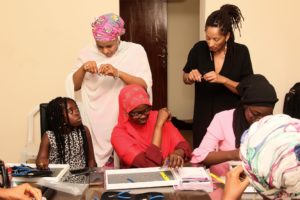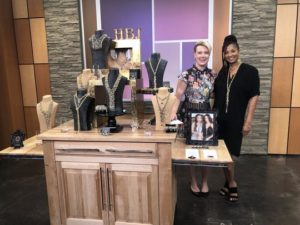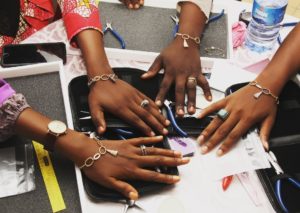Helping Your Business Survive this Crisis – and the Next One
When COVID-19 brought the world economy to a standstill in early 2020, every business around the globe was affected in some way. After prolonged lockdowns in many countries, the world has entered a recession that has the potential to shrink the global economy by more than 5%, the worst recession since World War II.
While many businesses have shuttered in recent months due to decreased profits and an inability to make ends meet, it doesn’t have to be that way, advises Sheila Hawkins-Bucklew, 2017 Reciprocal Exchange Awardee, serial entrepreneur, and owner of Hawkins-Bucklew Jewelry Designs in Austin, Texas. Though this is a challenging time to be a business owner, companies can use opportunities presented by the pandemic—and any other downturn or crisis—to realign themselves to the new market and come out on top.
From Austin to Lagos
When Sheila met 2016 Fellowship Alumna Hauwa Liman during her Leadership in Business Institute at The University of Texas at Austin, they immediately connected over a mutual love of fashion and empowering women. Later, they applied for a Reciprocal Exchange Award, through which Sheila traveled to Lagos, Nigeria, to run creative women’s entrepreneurship bootcamps with Hauwa.
The trip to Lagos was a life-changing experience for Sheila, spurring the creation of a new jewelry collection called “From Lagos With Love.” “One necklace shows what it was like building bridges … connecting the United States with the continent of Africa,” she says. “[The collection] allowed me to share the Reciprocal Exchange experience back home in Austin and with our clients all over the U.S.”

Sheila also expanded her business portfolio based on ideas sparked by the trip, initiating Showroom 808, a social enterprise and collaborative community for creative women entrepreneurs. Launched in 2019, Showroom 808 is designed to hold events and celebrate the different cultural traditions and perspectives of Austin-based entrepreneurs, much like the diverse group of Christian and Muslim, northern and southern Nigerian women who collaborated during the Reciprocal Exchange workshops in Lagos.
Weathering Booms and Busts
As an entrepreneur and businesswoman, Sheila has worn many hats: real estate agent, designer, mentor, and coach, among others. In early 2020, COVID-19 dramatically changed the world, both in terms of day-to-day life and the broader global economy.
For Sheila, COVID-19 brought new challenges, but she was able to apply previous experience to address it: “Every industry has cycles built into it. A lot of my business planning comes from my real estate training – you have to always be ready to evaluate and pause, be ready for downturns, and make your business resilient in order to survive.”
When the Black Lives Matter (BLM) protests swept the world beginning in late May, Sheila, like many black business owners across the United States, saw an uptick in her business. She had already taken steps to make her business more present on digital platforms in light of COVID-19, but she hopes to find ways to maintain that level of activity for her company and other black-owned businesses across the country.
“Black women start businesses more often than any other group in the United States, but they have a hard time sustaining them,” says Sheila. “It would be great if people supported all of the businesses in their community year-round.”
Surviving this Crisis – and the Next One
Across all industries, businesses can use downturns like the current economic crisis to survive and thrive. Sheila’s advice to business owners in the Fellowship community is to seize the unique opportunities presented by the current environment.
Understand Essential Costs and Cut Extraneous Budget Items
Use this time to negotiate with suppliers, landlords, and other partners, and cut expensive things you can live without. Making your business more resilient now will help it remain resilient in the long term.
“Before COVID, the shopping center that our showroom was in was not getting enough foot traffic,” says Sheila. When COVID lockdowns were imposed, she decided not to renew their lease, instead taking the opportunity to temporarily reduce her costs and plan for a longer-term solution for her brick-and-mortar footprint.
Know Your Customers and How They’re Changing
Survey your customers and learn about their new wants and needs. “Since the pandemic started, a lot of [American] customers have shifted their perspectives,” Sheila says. “They’re more interested in shopping online and communicating digitally with businesses than before… Don’t wait until you have the perfect setup for a virtual event or other customer opportunity. You have to jump in and give it a try.”
She also suggests shifting your own perspectives on how the pandemic and related restrictions have changed in-person interactions. For example, while capacity limits might limit the number of customers you can have in a space, you can spin the restrictions to create a specialized shopping experience. “We did private appointments for our clients before COVID, but now it’s our main way to see customers in person,” Sheila says. “We use it as a chance to make them feel special.”
Additionally, Sheila says, join your local and national industry and trade associations to stay abreast of current best practices and upcoming changes in your sector. “Several years ago, getting into big-box retailers was what fashion brands were all trying to do… Now, the market has changed, having a strong digital presence offering customers a seamless shopping experience might be brands’ best bet for the near future.”
Set Yourself Up for Long-Term Success
It might seem counterintuitive, but many successful companies use downturns to scale their companies and move innovations forward at a faster pace.
“Downturns tend to weed people out who shouldn’t be in an industry,” says Sheila. “If you’re serious about your business, watch who is leaving the industry and take advantage of the market share that they just freed up.” She also recommends seeking out new partners whose mission aligns with your own and capitalizing on your combined efforts and resources.
Ultimately, Sheila says, you want to position yourself to better survive the next crisis. “Crises like COVID-19 force businesses to examine their finances and reassess how much is in their reserves. Get through the current pandemic and figure out how to ride the next one out better.”
Fellowship Alumni and selected candidates for 2021 who are interested in learning more about this topic are encouraged to take the Navigating a Business in a Crisis and Identifying Market Needs and Gaps courses through the Fellowship Portal. Learn more about the course.
If you have not yet registered for the Portal, please contact the Fellowship Team at mwfellowship@irex.org.
Written by Meredith Lopez. Contributions by Alison Boland-Reeves, Abbie Wade, and Trace Olson.


